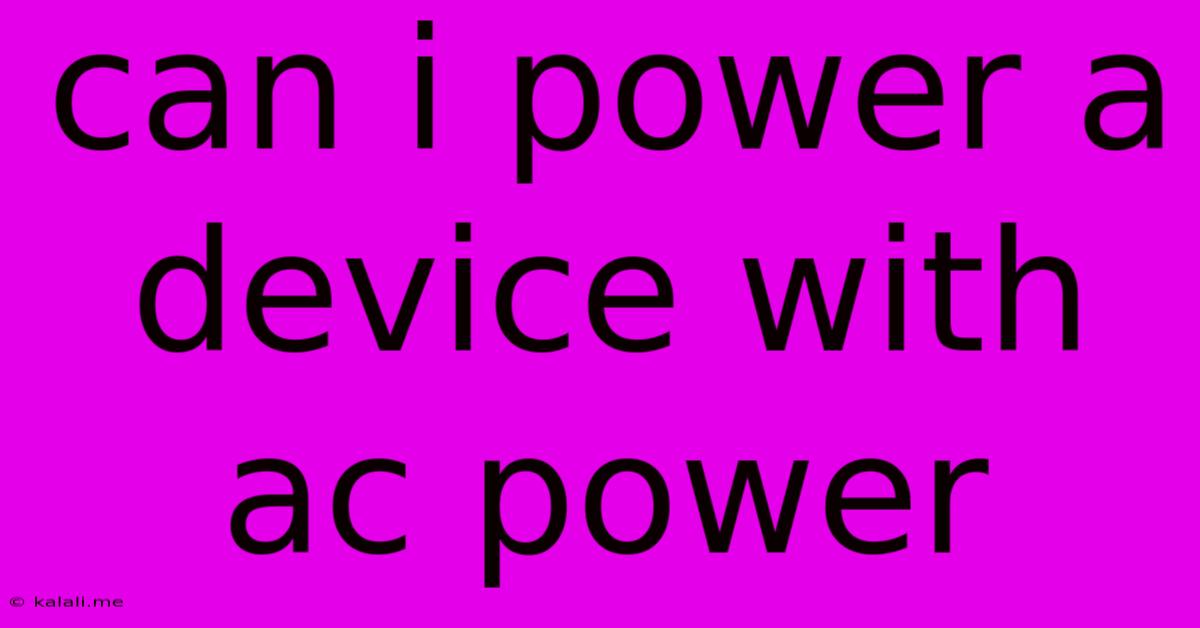Can I Power A Device With Ac Power
Kalali
Jun 02, 2025 · 3 min read

Table of Contents
Can I Power a Device with AC Power? Understanding AC Power and Device Compatibility
Many electronic devices need power to function, but not all devices can accept the same type of power. This article explores the question: Can I power a device with AC power? Understanding the difference between AC and DC power, along with device specifications, is crucial for safe and effective operation. The short answer is: it depends entirely on the device's design and specifications.
Understanding AC and DC Power
Before delving into device compatibility, let's clarify the fundamental difference between alternating current (AC) and direct current (DC) power.
-
AC Power: Alternating current continuously changes direction, oscillating back and forth at a specific frequency (usually 50 or 60 Hz). This is the type of power supplied by your home's electrical outlets. AC power is efficient for long-distance transmission, which is why it's the standard for household electricity.
-
DC Power: Direct current flows in one direction only. This is the type of power used by most electronic devices, including computers, smartphones, and many smaller appliances. Batteries provide DC power.
Device Compatibility and Power Supply Requirements
The key to determining whether a device can operate on AC power lies in its power supply requirements. Most devices that use household power will have a power adapter, often called a power brick or wall wart. This adapter converts the incoming AC power from your outlet into the lower-voltage DC power needed by the device's internal circuitry.
Devices that directly use AC power: Some devices, such as older incandescent light bulbs, electric heaters, and certain types of motors, are designed to operate directly on AC power. These devices are built to handle the fluctuating voltage and current. However, they are typically not low-voltage devices like your average electronic device.
Devices requiring AC-to-DC conversion: Most modern electronics, such as laptops, smartphones, and tablets, require DC power. Their power adapters perform this crucial conversion. Attempting to directly connect these devices to an AC outlet without the proper adapter can severely damage or destroy them.
Identifying your Device's Power Requirements
Always check your device's specifications, often found on a label on the device itself or in its user manual. This label will indicate:
- Input voltage: This specifies the voltage the device's power adapter expects from the AC outlet (e.g., 100-240V).
- Output voltage: This shows the DC voltage supplied to the device itself (e.g., 12V, 19V, 5V).
- Frequency: This indicates the AC frequency the device's adapter is designed to work with (e.g., 50/60Hz).
Consequences of Mismatched Power Supply
Connecting a device to an incompatible power source can have severe consequences:
- Damage to the device: The most common outcome is irreversible damage to the internal components.
- Fire hazard: In extreme cases, incorrect power can cause overheating and even fire.
- Electric shock: If mishandled, incorrect power can result in electric shock.
In Conclusion:
While some devices are designed to operate directly on AC power, most modern electronic devices require a power adapter to convert AC to DC. Always carefully check the device's specifications and use the correct power adapter to ensure safe and proper operation. Never attempt to bypass the power adapter and connect a device directly to an AC outlet unless explicitly designed for it. Safety should always be your top priority.
Latest Posts
Latest Posts
-
Can I Use 0w20 Instead Of 5w20
Jun 03, 2025
-
How Root Android And Still Get Updates
Jun 03, 2025
-
How Many Grams Of Nhci Cann Dissove 40
Jun 03, 2025
-
What Person Still Looks Good But Ld
Jun 03, 2025
-
How To Fix A Broken Sprinkler Pipe
Jun 03, 2025
Related Post
Thank you for visiting our website which covers about Can I Power A Device With Ac Power . We hope the information provided has been useful to you. Feel free to contact us if you have any questions or need further assistance. See you next time and don't miss to bookmark.